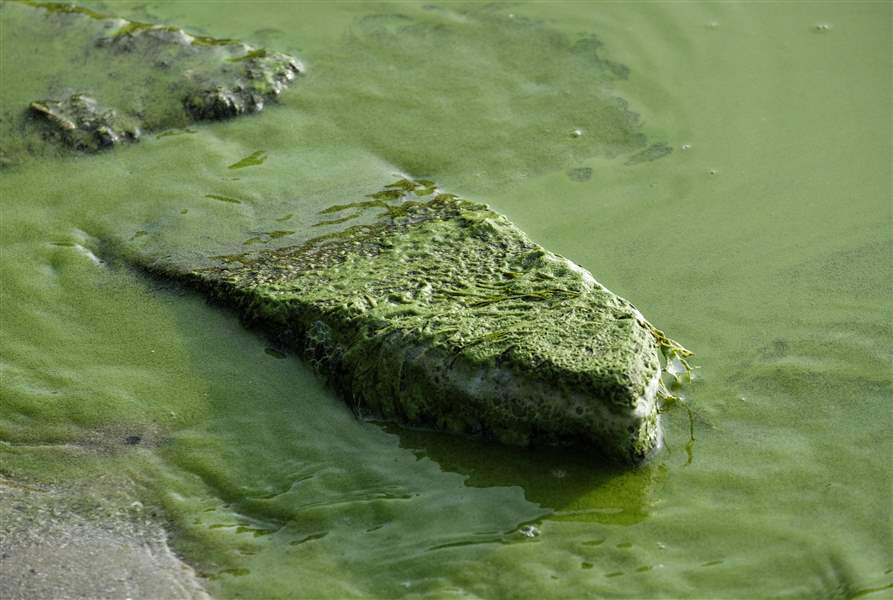
When the pollution comes knocking at your door
9/26/2017
Algae washes ashore at the end of 113th Street in Point Place, Wednesday on Sept. 20.
The Blade/Andy Morrison
Buy This Image
Toledo’s dirty secret is out. It’s been out for a long time, but now it is RIGHT out at the city’s front door along the Maumee River. Lake Erie’s algae pollution requires urgent action — and now Mayor Paula Hicks-Hudson is joining the chorus of voices calling for federal help to clean it up.
The mayor’s about-face on the issue of asking for federal impairment status for Lake Erie came Tuesday on the banks of the Maumee where this season’s algae bloom has drifted upriver.
Click here to read more Blade editorials
In truth public officials have known about the algae’s threat to the region’s economy, tourism, quality of life, and future livability for decades. And they have known the matter was critical since at least August, 2014, when the algae toxin overwhelmed Toledo’s water-treatment facility and left more than 500,000 customers without water for three days.
But even after that, Ms. Hicks-Hudson and others — including Gov. John Kasich — resisted calling on federal authorities to declare the lake impaired, triggering a Clean Water Act clean-up effort.
The mayor had resisted calling on authorities to label the lake as impaired. The label, she had argued, would give the region a black eye and hamper economic development and tourism.
Ms. Hicks-Hudson’s staff also has warned that impairment — and the federal mandates certain to come with it — are likely to cost the city money. It will inevitably require Toledo and other municipalities to spend money on projects to prevent combined-sewer overflows.
The impaired designation will not be a magic wand that miraculously clears the lake of pollution, but it will bring federal resources to the fight and it will begin a comprehensive process to identify pollution sources and quantify how much algae-feeding pollution they are contributing the lake.
Just as importantly, a federal impairment designation means that goals for reducing pollution will come with teeth, not just good will.
Mr. Kasich has rejected calls for an impairment designation, insisting that voluntary initiatives to reduce lake pollution will bring the necessary results.
This is foolish and demonstrably untrue. Take a look out any river-facing window in Toledo this week. Does it look like the region is getting anywhere near the 40-percent reduction in algae-feeding phosphorus that everyone has voluntarily agreed to meet?
Now is the time for Mr. Kasich to see what Ms. Hicks-Hudson can see from the banks of the Maumee. And now is the time for Ohio’s senators, Republican Rob Portman and Democrat Sherrod Brown, to also join the fight to secure the federal clean-up project that will be necessary to save Lake Erie and Toledo.
The city’s leadership has taken another step toward a consensus that, yes, cleaning up Lake Erie will cost money, but turning a blind eye to the pollution is going to cost the region much, much more. The lake’s algae problem is now at our door and it is time to call it what it is — impaired.